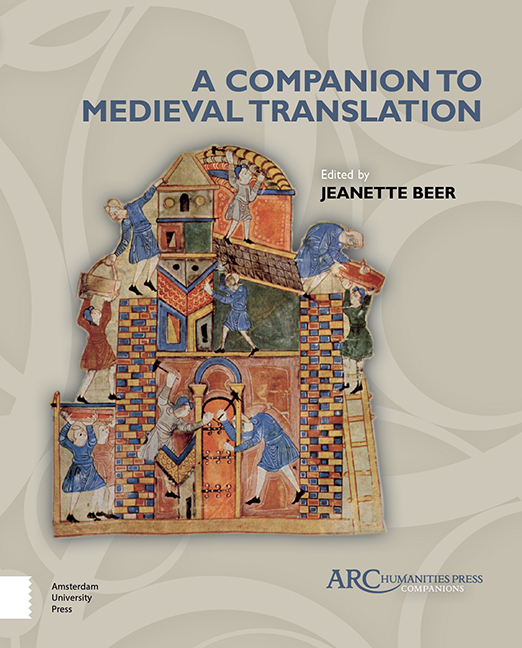Book contents
- Frontmatter
- Contents
- Acknowledgements
- Introduction
- Chapter 1 The European Psalms in Translation
- Chapter 2 The Old French Bible
- Chapter 3 Middle English Religious Translation
- Chapter 4 Bible Translation and Controversy in Late Medieval England
- Chapter 5 Medieval Convent Drama: Translating Scripture and Transforming the Liturgy
- Chapter 6 Translating Romance in Medieval Norway: Marie de France and Strengleikar
- Chapter 7 Christine de Pizan, Translator and Translation Critic
- Chapter 8 Translation, Authority, and the Valorization of the Vernacular
- Chapter 9 Vernacular Translation in Medieval Italy: volgarizzamento
- Chapter 10 Dante and Translation
- Chapter 11 Chaucer and Translation
- Chapter 12 Alchemy and Translation
- Chapter 13 Scientific Translation: A Modern Editor’s Perspectiv
- Chapter 14 Modern Theoretical Approaches to Medieval Translation
- Chapter 15 Observations on Translation by a Thirteenth-Century Maître: Li Fet des Romains
- Epilogue. Observations on Translation by the Oxford Professor of Poetry: Pearl
- General Bibliography
- Appendix
- Index
Chapter 15 - Observations on Translation by a Thirteenth-Century Maître: Li Fet des Romains
Published online by Cambridge University Press: 20 November 2020
- Frontmatter
- Contents
- Acknowledgements
- Introduction
- Chapter 1 The European Psalms in Translation
- Chapter 2 The Old French Bible
- Chapter 3 Middle English Religious Translation
- Chapter 4 Bible Translation and Controversy in Late Medieval England
- Chapter 5 Medieval Convent Drama: Translating Scripture and Transforming the Liturgy
- Chapter 6 Translating Romance in Medieval Norway: Marie de France and Strengleikar
- Chapter 7 Christine de Pizan, Translator and Translation Critic
- Chapter 8 Translation, Authority, and the Valorization of the Vernacular
- Chapter 9 Vernacular Translation in Medieval Italy: volgarizzamento
- Chapter 10 Dante and Translation
- Chapter 11 Chaucer and Translation
- Chapter 12 Alchemy and Translation
- Chapter 13 Scientific Translation: A Modern Editor’s Perspectiv
- Chapter 14 Modern Theoretical Approaches to Medieval Translation
- Chapter 15 Observations on Translation by a Thirteenth-Century Maître: Li Fet des Romains
- Epilogue. Observations on Translation by the Oxford Professor of Poetry: Pearl
- General Bibliography
- Appendix
- Index
Summary
Translators in the Middle Ages did not usually provide explanations in medias res about the translation process. The anonymous translator who compiled Li Fet des Romains was unusual in this regard. Li Fet des Romains is the earliest extant work of ancient historiography— and biography— to be translated from Latin into a European vernacular. It was a monumental undertaking to compile and translate all known materials pertaining to Julius Caesar in the early thirteenth century. The translator's motivation is unclear, but this much is obvious. He serves no patron. Cognizant of his role as a bridge between the Latin-literate and the illiterate, “ces laies genz,” his devotion to his task never wavers. He believes strongly in its usefulness, yet his target audience is not specified. He works from a context where manuscripts and glosses are available to him, probably the University of Paris. He is happy to express personal views on a variety of subjects, yet feels no need or desire to identify himself. It is difficult to determine whether he is ruminating aloud when he makes occasional comments, or whether his remarks are intended as aids to fellow clercs or students who want to follow his translation example. Whatever the intent, the interpolated additions contribute greatly to our understanding both of medieval translation and of various other aspects of thirteenth-century culture. This chapter briefly examines his prologue, then focuses upon his observations about the geographic and political context, his sources, conflicts in their information, translative fidelity, and rhetorical devices.
The Prologue
In his prologue, derived from Sallust's Catilina I and II, he exhorts his public to rise above an unthinking animal existence to seek lasting glory because “[l] a vie de l’ome est bries, mes vertuz, raisons et engins fet longue la memoire de l’ome après la mort” (Man's life is short, but virtue, reason, and intelligence cause man to be remembered long after death).
- Type
- Chapter
- Information
- Companion to Medieval Translation , pp. 175 - 184Publisher: Amsterdam University PressPrint publication year: 2019



